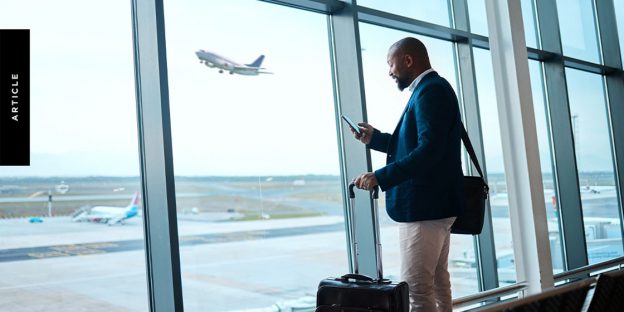There was a flush of SME business travel post COVID-19, and even the uncertain economic times since hasn’t curbed that interest.
But with the increasing risks of flight delays or cancellations, political/industrial disruption or illness, how can you protect your business travellers?
This article explores two types of cover – corporate travel insurance and journey insurance. We’ll explain which could be the best fit depending on your circumstances.
What does corporate travel insurance cover?
Corporate travel insurance, also known as business travel cover, protects staff and owners who travel in their state, interstate, or overseas for business. It offers cover for your company should serious illness, accidents, or travel disruptions have financial repercussions.
This policy also protects business owners travelling with their family on personal trips.
Typically, corporate travel insurance covers:
- Personal liability, injury and illness (e.g. food poisoning) while travelling
- Emergency overseas medical and evacuation costs
- 24-hour emergency help
- Damaged or lost items such as luggage, personal belongings, travel documents, cash, and credit cards
- Evacuation expenses due to political risk or natural disaster
- Missed transfers and transport
- Excess cover for rental vehicles
- Kidnap and ransom.
As well, some policies also cover cancellation, extra expenses, repatriation expenses, deposit loss, non-refundable flight and accommodation costs, and overseas medical expenses. However, if you’re opting for a business credit card for travel protection, you may find they’re often quite limited.
Business travel insurance often won’t cover pregnancy, childbirth, or alcohol or illegal drug-related incidents. And, avoid the government’s list of ‘do-not-travel’ to countries.
If your staff do get in trouble overseas, this is how Australian consular services can help. They won’t pay your medical bills, though.
When is corporate travel insurance important?
When travelling for business, this creates obligations on the employer.
Just say one of your managers is attending a US conference for work, and is injured in a car accident. US healthcare could potentially bill your company for thousands of dollars. Other pricy countries for healthcare include Monaco, Luxembourg, Qatar, Norway, and Switzerland. Corporate travel insurance is a good investment against those possible unexpected costs.
And, if your employee’s luggage goes missing or is delayed, or there are issues with their money and travel documents, or they are kidnapped, corporate travel cover can also help.
Such a policy is also useful for domestic travel. For example, your staff member can’t travel due to sickness in their family, or their luggage has gone and, with it, clothes and a digital device for their business presentation. Domestic travel insurance comes into play for cancellation of flights/services, baggage cover and car hire excess.
However, ensure they have written proof of the loss and if a theft is involved, report it to the police within 24 hours.
What does journey insurance cover?
Meanwhile, journey insurance sounds like the same thing as corporate or business travel cover, but it’s different. Journey insurance protects your staff who are injured (or killed) while travelling between work and home.
Typically, workers’ compensation won’t cover this transit if the workplace is in NSW, Victoria, South Australia, Western Australia, and Tasmania.
Most journey insurance policies include coverage for:
- Loss of wages and benefits because of an injury
- Rehabilitation support
- Expenses for relocating, vehicle medication following permanent disability
- Home help and domestic costs
- Payment of credit card debts
- Compensation if the staff member has broken bones
- Lump sum payment for permanent disability or death due to the injury or disappearance, and
- Funeral expenses.
When is journey insurance important?
Journey insurance is a perk for would-be and current employees. Offering this benefit can make your business a standout employer in the era of a skilled labour shortage and high job vacancy rates. Staff will appreciate you’re serious about your duty of care to them.
Get in touch with us to help protect your business against the risks of travel – domestically and internationally. We can help tailor the right level of cover for your needs and risks, including those in the destination and stopovers.


